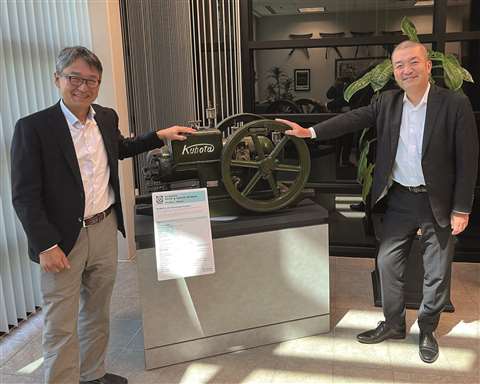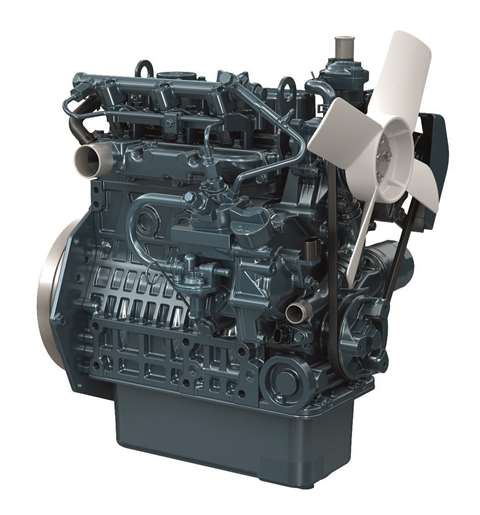Kubota marks a century of combustion
17 November 2022
 As Kubota marks its 100th year of engine manufacturing, Toshiyuki Taneda (right), executive officer and general manager of the Engine Division, and Tomokazu Matsushita, president of Kubota Engine America, are optimistic about the future of combustion engines. (Photo: Kubota)
As Kubota marks its 100th year of engine manufacturing, Toshiyuki Taneda (right), executive officer and general manager of the Engine Division, and Tomokazu Matsushita, president of Kubota Engine America, are optimistic about the future of combustion engines. (Photo: Kubota)
While there are those who believe that the sun has begun to set on the era of the combustion engine, they’d probably have a hard time convincing the leadership of Kubota Corp.’s Engine Division.
Because after marking 100 years as a manufacturer of diesel and spark-ignited engines for off-highway and industrial applications, the company’s top management – globally and in North America – see many future prospects for Kubota’s next century.
There does seem to be cause for those future prospects. The company, which began by building kerosene engines for agricultural applications in 1922, some 20 years after it was established as a foundry in Osaka, Japan, has established itself as the leading small diesel engine brand globally, and in the U.S. through its Kubota Engine America (KEA) subsidiary, which will be celebrating its 25th anniversary in 2023.
Growing with customers
Kubota achieved its position by following a steady, deliberate process of product development that continues today.
“We are expanding our product lineup one by one, step by step,” Toshiyuki Taneda, executive officer and division general manager of the Engine Division of Kubota Corp., explained during a recent visit to North America. “We have established a seamless power lineup – that’s the reason we can stay successful in the United States, in Europe, Japan and the rest of the world.
“In many cases, we have grown up with the customer. The customer is making a small machine and they prefer our engine. Then the customer wants to expand their business to the bigger end, and they ask us do you have a bigger engine? So, we say okay, we will develop [an engine] and so we grow with the customer.
“That takes time. I joined Kubota 30 years ago. At that time, we were on the way with the development of a 3.3 L engine. Thirty years later, we developed a 5 L and are releasing it to the customer. We want to expand our range, but it takes time.”
Tomokazu Matsushita, who is in his second stint as president of KEA, added that Kubota “started with a 3 L engine, then we changed the bore and the stroke to 3.3 L, then we changed to 3.6 L and then 3.8 L and so on. Step by step is the manner of [our] approach.
 Kubota believes that engines such as the newest D902-K, its first diesel under 25 hp with a high-pressure common rail system and electronic controls, will continue to play a significant role in powering industrial equipment in the future. (Photo: Kubota)
Kubota believes that engines such as the newest D902-K, its first diesel under 25 hp with a high-pressure common rail system and electronic controls, will continue to play a significant role in powering industrial equipment in the future. (Photo: Kubota)
“But it’s keeping the same footprint, the same crankcase, so it’s very easy for the customer. Many industrial manufacturers don’t have enough engineering resources, so if the new engine is completely different, it’s not so easy for them to replace [the previous engine].
“We call it ‘one source, multiple solutions.’ That means a diesel engine can have the same footprint, same base as a spark-ignited LNG or CNG. Based on the customer’s requirement, we will develop the application together with the customer. That is the core spirit of our business.”
That spirit has led to a number of new engine developments over the last several years. The company expanded the top end of its range with the 5 L, V5009 diesel rated 211 hp and previewed a 7.5 L engine that is expected to top 300 hp in the future.
More significantly, Kubota made a major move in its bread-and-butter small engine segment with the D902-K, which brings electronic control and common rail fuel technology to its sub-25 hp (19 kW) for the first time.
Kubota also launched a new series of large spark-ignited engines, as well as its own micro-hybrid system that combines a V3307-T diesel with a motor-generator and lithium-ion battery.
Positive on engines
Key to Kubota’s outlook is that combustion engines will continue to play a central role in powering industrial equipment for the foreseeable future.
“We started engine production 100 years ago,” Taneda said. “At that time, nobody could predict Kubota as the number one manufacturer in small engines. Nobody can predict the next 100 years - it’s very difficult.
“But we have invested in the engine business continuously and we will develop engine products, not move to batteries and fuel cells. We are engine manufacturers, engine guys. Small common rail engines or hybrids or even alternative fuels like hydrogen – that’s our goal.
“Engines are very economical, and in terms of safety, they are well proven. I don’t want to say that batteries are risky, but diesel engines are a safe, proven power source and that’s a big advantage. It’s an easy solution.”
Batteries, he said, would find more uses in non-industrial markets such as passenger cars. “Even commercial vehicles, their application needs more power than passenger cars and longer distances,” Taneda said. “Therefore, that’s rather difficult to cover with batteries.
“However, I don’t want to deny the possibility of the battery, and the engine and the battery may contribute to future society together. Certain portions of the industry may need battery power. But I believe a very big portion of the industry will still need engines.”
Even if those engines may well be running on something other than diesel fuel. “Certain applications will use HVO,” Taneda said. “Certain applications will be hybrid and other applications will use other fuels, like hydrogen or even a battery. There will be multiple solutions.
“The way to a carbon neutral society is not one way. And we want to show as many ways as possible to the customer.”
STAY CONNECTED




Receive the information you need when you need it through our world-leading magazines, newsletters and daily briefings.
POWER SOURCING GUIDE
The trusted reference and buyer’s guide for 83 years
The original “desktop search engine,” guiding nearly 10,000 users in more than 90 countries it is the primary reference for specifications and details on all the components that go into engine systems.
Visit Now
CONNECT WITH THE TEAM









